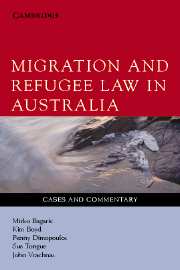Book contents
- Frontmatter
- Contents
- Detailed table of contents
- Table of cases
- Table of statutes
- 1 Thinking about migration law and national borders: An aspirational benchmark?
- 2 Introduction to Australian immigration law
- 3 Family and interdependency visas
- 4 Business and investment and skill-based visas
- 5 Temporary visas
- 6 Miscellaneous visas
- 7 Common visa requirements
- 8 Introduction to Australian refugee law: The Refugees Convention in Australian domestic law
- 9 Convention grounds
- 10 Persecution
- 11 Well-founded fear of persecution
- 12 Limits on protection of refugees: Cessation, exclusion exceptions and protection by another country
- 13 Cancellation of visas
- 14 Judicial review
- 15 Migration and human rights
- Index
2 - Introduction to Australian immigration law
Published online by Cambridge University Press: 05 June 2012
- Frontmatter
- Contents
- Detailed table of contents
- Table of cases
- Table of statutes
- 1 Thinking about migration law and national borders: An aspirational benchmark?
- 2 Introduction to Australian immigration law
- 3 Family and interdependency visas
- 4 Business and investment and skill-based visas
- 5 Temporary visas
- 6 Miscellaneous visas
- 7 Common visa requirements
- 8 Introduction to Australian refugee law: The Refugees Convention in Australian domestic law
- 9 Convention grounds
- 10 Persecution
- 11 Well-founded fear of persecution
- 12 Limits on protection of refugees: Cessation, exclusion exceptions and protection by another country
- 13 Cancellation of visas
- 14 Judicial review
- 15 Migration and human rights
- Index
Summary
Sovereignty
A defining aspect of national sovereignty is the right of nation–states to determine which people are permitted to come within their geographical borders. This casebook is about how Australia exercises this right.
One of the rights possessed by the supreme power in every State is the right to refuse to permit an alien to enter that State, to annex what conditions it pleases to the permission to enter it, and to expel or deport from the State, at pleasure, even a friendly alien, especially if it considers his presence in the state opposed to its peace, order, and good government, or to its social and material interests.
Individuals, like nations, appear to be inherently territorial. Also, a defining aspect of many people's personhood (their core identity) is the place where they were born or live.
Immigration policy and law is concerned with setting the parameters by which ‘foreigners’ (or ‘aliens’ as they are called in the Commonwealth Constitution) come to share and enrich our community, enjoy our resources and become exposed to our culture and values, whether it be permanently or for a shorter period.
In determining its immigration law, a country cannot ignore what is happening in the wider world. In an increasingly globalised economy where regional agreements are becoming more common, traditional attitudes to borders are changing. The notion of sovereignty, while still an important element of international law, is altering.
With the increasing movement of people plus globalisation, there is a developing discussion of the duties of states that exist alongside their rights.
- Type
- Chapter
- Information
- Migration and Refugee Law in AustraliaCases and Commentary, pp. 28 - 55Publisher: Cambridge University PressPrint publication year: 2006

